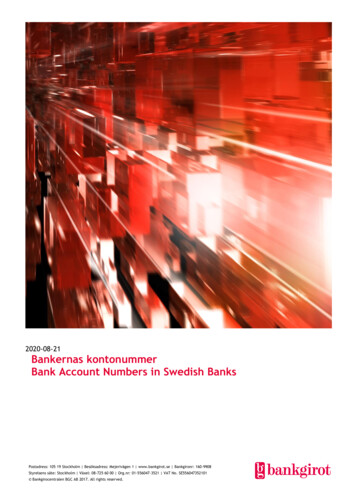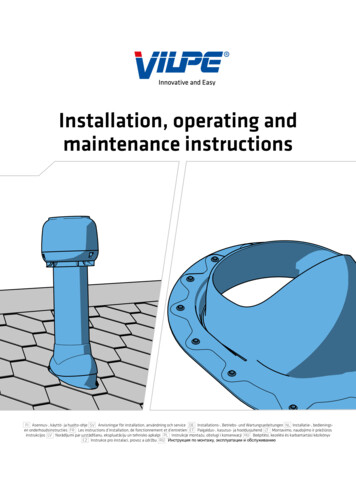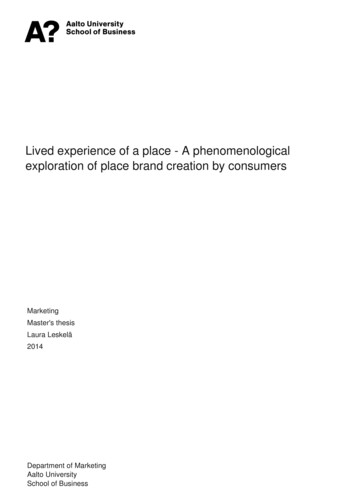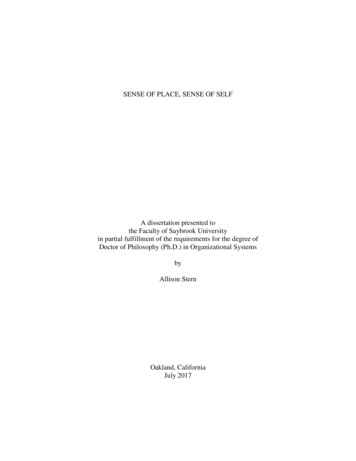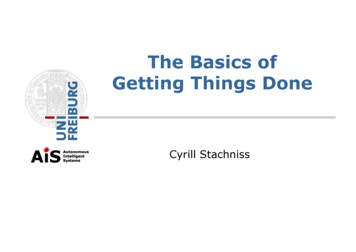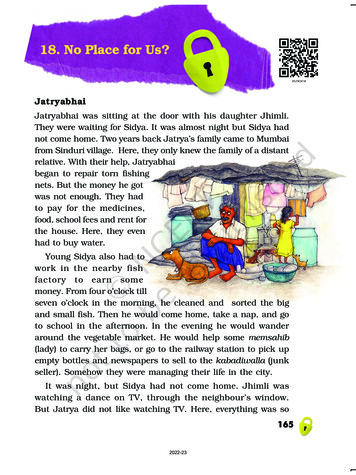
Transcription
18. No Place for Us?JatryabhaiJatryabhai was sitting at the door with his daughter Jhimli.They were waiting for Sidya. It was almost night but Sidya hadnot come home. Two years back Jatrya’s family came to Mumbaifrom Sinduri village. Here, they only knew the family of a distantrelative. With their help, Jatryabhaibegan to repair torn fishingnets. But the money he gotwas not enough. They hadto pay for the medicines,food, school fees and rent forthe house. Here, they evenhad to buy water.Young Sidya also had towork in the nearby fishfactory to earn somemoney. From four o’clock tillseven o’clock in the morning, he cleaned and sorted the bigand small fish. Then he would come home, take a nap, and goto school in the afternoon. In the evening he would wanderaround the vegetable market. He would help some memsahib(lady) to carry her bags, or go to the railway station to pick upempty bottles and newspapers to sell to the kabadiwalla (junkseller). Somehow they were managing their life in the city.It was night, but Sidya had not come home. Jhimli waswatching a dance on TV, through the neighbour’s window.But Jatrya did not like watching TV. Here, everything was so165No Place for Us?2022-23
different. The day would pass running around for work, but theevening brought back old memories.Think and tellw Jatrya felt alone, even in a crowd of people. Have you everfelt like this?w Imagine how it feels to leave one’s own place and go faraway to live in a new place?w Why do you think families like that of Jatrya’s are comingto big cities?w Have you seen any children (in your school orneighbourhood) who also go to work?w What kind of work do they do? Why do they have to work?Remembering old daysJatrya was born in Khedi village, in the middle of thick greenjungles and hills. His people had been living here for many years– even before his grandfather was born.There was peace in Jatrya’s village, but not silence. Therewere so many soothing sounds – the gurgle of the flowing river,the murmur of trees and the chirping of birds. People did farming.They would go to the nearby forest, chatting and singing together,to collect wild fruits, roots and dried wood. While working withelders, children also learnt many things – to dance together, toplay flute and dhol, to make pots of clay and bamboo, torecognise birds and imitate their sounds, etc. People collected166Looking Around2022-23
things from the forest for their use. Some of those they wouldsell in the town across the river. With that money they wouldbuy salt, oil, rice and some clothes.It was a village, but people here lived together like a bigfamily. Jatrya’s sister was married in the same village. Peoplehelped each other, in good and bad times. The elders wouldarrange weddings, and settle quarrels.Jatrya was now a strong young man.He worked hard in the fields and caughtfish from the big river. He and his friendswould go to the forest to collect fruits,roots and plants for medicines, and fishfrom the river, to sell these in the town.During festival time, Jatrya would danceand play the drum, with boys and girlsof his age.Tellw In Khedi village what all did children learn?w What do you learn from your elders?w Jatrya learnt so many things in Khedi. How many of thosewould be useful for him in Mumbai?w Do you hear the sounds of birds everyday? Which ones?w Can you imitate the sound of any bird? Show how.w What are some of the sounds that you hear everyday, butthe people of Khedi may not be hearing?w Have you experienced silence? When and where?Teacher’s Note : Children can be made sensitive to the experience of ‘calm’ or‘peace’ as clearly different from ‘silence’. They can do this through the activity oflistening to sounds with their eyes closed. When they are calm and the classbecomes quiet, they can still hear many sounds. So there can be peace, butthere need not be silence.167No Place for Us?2022-23
Across the riverOne day the people of Khedi heard that a big dam was to bebuilt on the river. For this, a big wall would be built to stop theflow of the river. Khedi and many nearby villages in that areawould be drowned under water. The people would have to leavetheir villages and their lands, on which their forefathers hadlived for centuries.After a few days, government officials along with the policestarted visiting these villages. Small children of the village sawthe police for the first time. Some children would run after them,and some would get scared and start crying. The officialsmeasured the width and length of the river, the fields, forestsand houses. They called meetings with the elders of the village.They said, “Villages on the bank of the river would have to beremoved. People having land at Khedi will be given land faraway, on the other side of the river. They will have everythingthere – a school, electricity, hospitals, buses,trains, etc. They will have all that they couldnot even dream of here in Khedi.”Jatrya’s parents and most elderswere not happy about leavingtheir village.Listening to all this, Jatryawould get a little scared, but alsofeel excited. He would think thatafter getting married, he wouldtake his bride to the new housein the new village. A house wherehe could just press a button for the light and turn on the tap forwater. He could go by bus to see the city. When he would havechildren, he could send them to school. They will not be likehim, who had never been to school.168Looking Around2022-23
Discuss and tellw Many people in Jatrya’s village did not agree to move awayfrom their land and forest. Why? They had to leave eventhough they didn’t want to. Why?w In Khedi, how many people were there in Jatrya’s family?When he thought about his family who all came to hismind?w Who all come to your mind when you think about yourfamily?w Have you heard of people who don’t want to be moved fromtheir old place? Talk about them.w Do you know some people who have never been to school?Do you also know of any place where there is no school?Imaginew Think of the kinds of difficulties people have to face wherea dam is being built.w Draw a picture of Khedi village and a picture of Jatrya'sdream village. Discuss the differences between them. Alsolook at the pictures your friends have drawn.A new placeIt was a summer afternoon. Jatrya was feeling faint in the hotsun and wind. His feet were burning on the coal tar of the puccaroad. There wasn’t a single tree to offer some shade. Just a fewhouses and shops. Jatrya was on his way home after buyingmedicines. He had an old tyre on his back. These days, he hadTeacher’s Note : Discuss with children the different aspects of dams. You cangive examples of any dams in your area or nearby. Dam may benefit some, butthere are some people for whom dam may bring problems, all these can bediscussed in classroom.169No Place for Us?2022-23
to light his stove with just these rubber pieces of old tyres.These caught fire fast, and also saved some firewood. But thesmoke and smell of burning tyreswere terrible!In this new Sinduri village, theyhad to pay money for everything—medicines, food, vegetables,firewood, and fodder for theanimals. They could just notafford to buy kerosene. But fromwhere to get the money for all this?Thinking of all this, Jatryareached home. The roof made of atin sheet made the house hot like an oven. Jatrya’s wife had highfever. His daughter Jhimli was rocking her little brother Sidya tosleep in her lap. After all, there was no other older person withthem. Jatrya’s parents had been so sad about leaving Khedi thatthey had died before he moved here.In Sinduri there were only eight-ten families he could call hisown, those from his old village. The whole village had got scatteredand people had gone wherever they had been given land.This was not like the new village Jatrya had dreamt about.There was electricity, but only for sometime in a day. And then,the electricity bill had also to be paid. There were taps, but nowater!In this village, Jatrya got just one room in a tin shed. It hadno place to keep the animals. He also got a small piece of land.But that was not good for farming. It was full of rocks and stones.Still Jatrya and his family worked very hard. But they could notgrow much on the field, and could not make enough moneyeven to buy seeds and fertilisers. In Khedi, people did not fallsick often. If someone fell ill there were many people who knew170Looking Around2022-23
how to treat them with medicines made from plants. People feltbetter after taking those medicines. Here in Sinduri, there wasa hospital but it was difficult to find doctors, and there were nomedicines.There was a school here, but the teacher did not care muchabout the children from Khedi village. These children found itdifficult to study in a new language. The people of Sinduri didnot welcome the newcomers from Khedi. They found theirlanguage and way of living strange. They made fun of the Khedipeople by calling them ‘unwanted guests’. Not much of what hehad dreamt had come true!Writew Was Sinduri like the village of Jatrya’s dreams?w What difference did he find between Sinduri and his dreamvillage?w Have you ever been to anyone’s house as an ‘unwantedguest’? How did you feel?w What all does your family do, when you have guests athome for a few days?Some years laterJatrya stayed for a few years in Sinduri. The children were alsogetting older. But Jatrya’s heart was not here in Sinduri. He stillmissed his old Khedi.But there was no Khedi now. There was a big dam and a biglake of collected water in and around Khedi. Jatrya thought, “Ifwe are to be called ‘unwanted guests’, then at least let us go tosome place where our dreams can come true.” Jatrya sold hisland and his animals and came to Mumbai. Here, he started anew life with his family. His only dream was to send his childrento school, to give them a better future, a better life.171No Place for Us?2022-23
Here too, things were not easy. But hehoped that things would getbetter.Jatrya started savingmoney to repair hisone-room shack. Hisrelatives would tellhim, “Don’t wastemoney on this. Whoknows, we may haveto move from heretoo. In Mumbai thereis no place to stay foroutsiders like us.”Jatrya was scared and worried. He thought, “We left Khedifor Sinduri, we then left Sinduri for Mumbai. If we have tomove from here too, then where can we go? In this big city, isthere not even a small place for my family to stay?”Thinkw What had Jatryabhai thought while moving to Mumbai?Did he find Mumbai as he had imagined?w What kind of school do you think Jatrya’s children wouldbe going to in Mumbai?Teacher’s Note : Discuss with children about the difference between peoplebeing ‘displaced’ or asked to move from a place, and those who go on a ‘transfer’.Both situations may cause different kinds of problems and difficulties. Discusshow many big projects like dams, bridges, highways, factories are promoted inthe name of development. Do all people benefit from these? These are live issueswhich can be related to many newspaper reports and ongoing debates.172Looking Around2022-23
Find out and writew Do you know of any family that has come to your townafter having moved out of their place? Talk to them andfind out:- From where have they come? Why did they have to comehere?- What kind of place did they live in there? How do theyfind this new place compared to the old one?- Is their language and way of living any different fromthat of the people here? In what ways?- Learn some words from their language and write themin your notebook.- Do they know how to make some things that you cannotmake? What?w Have you ever read or heard of a city slum being removed?How do you feel about this?w People also shift from one place to another when they gettransferred in their jobs? How do they feel then?Debatew Some people say that – “The city people do not creategarbage. Cities are dirty because of the slums.” How doyou feel about this? Discuss and debate betweenyourselves.What we have learntw Like Jatrya’s family, thousands of families come tostay in big cities for many different reasons. Do youthink their life may be better in a big city from whatit was before? Imagine how they feel in a big city.173No Place for Us?2022-23
It was a village, but people here lived together like a big family. Jatrya’s sister was married in the same village. People helped each other, in good and bad times. The elders would arrange weddings, and settle quarrels. Jatrya was now a strong young man. He worked hard in the fields and caught fish




